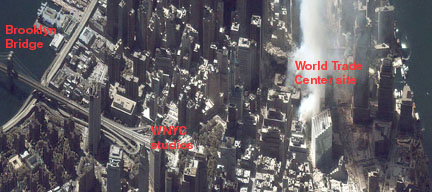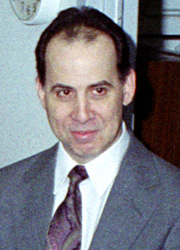
The collapse of the World Trade Center towers prompted evaculation of the vicinity, including the headquarters of WNYC Radio, as shown in photo taken by a satellite. (Credit: spaceimaging.com. Copyright ©Space Imaging. All rights reserved. Online and news media distribution or publishing requires permission from Space Imaging.)
Tower collapse takes engineer, pubcast signals
When terrorists brought down the World Trade Center in an imploding, crumbling crash, they not only destroyed New York City's highest buildings but silenced eight of its largest TV stations.
WNET, the city's flagship public TV station, was knocked off the air for five days and apparently lost Rod Coppola, a 47-year-old engineer who was working at its transmitter site atop Tower One. The tower also took with it $8 million in transmitter and antenna equipment.
Every major station in the city — except for WCBS, which maintained a backup transmitter on the Empire State Building — went down in the crash of the WTC, extinguishing service to one in five households — 7.3 million — that receives TV over the air.
Nearly 80 percent of households didn't notice the interruption. They picked up their signals via cable and satellite, although some cable viewers in outlying areas of the city, where cable systems pick up TV signals off of the air, also went without service. (WNET was also missing from direct-to-home satellite services because DBS firms are carrying few local public TV signals.)
Somewhere in the mound of debris from the World Trade Center are WNET's two analog transmitters, brand new digital transmitter, switching equipment and other hardware. The station went back on the air Sunday when it juiced up a low-power, temporary transmitter across the river in New Jersey.
WNYC, the city's flagship NPR station, also went off the air when the World Trade Center collapsed. WNYC's AM signal, originating from New Jersey, continued to function at full power and was simulcast on WNYE-FM, the public radio station licensed to the city's Board of Education.
WNYC studios, mere blocks from ground zero, were unharmed but evacuated after the attacks. Power outages forced the station's reporters to relocate to NPR studios in midtown, and administrative personnel set up shop at WNET on West 33rd Street. WNYC was able to re-launch its FM service on Sunday from the Empire State Building.
WBAI, New York's Pacifica station, also went off the air in the wake of the attacks. Though it transmits from the Empire State Building, the station lost power when the city cut electricity and water service to lower Manhattan. WBAI is about six blocks from the WTC. Phone service is still down, but the station is back on the air, according to a Pacifica spokeswoman.
The city school system's WNYE-TV, based in Brooklyn, turned over its signal to ABC and New York 1, cable's NYC news service, after the attacks. The station also collaborated with WNET to air special PBS programming.
Coppola, a father of four daughters, had worked at WNET since 1985. On the morning of the 11th he was working on the 110th floor of the North Tower, where he had cheered the launch of WNET's digital signal just two months earlier. When the building fell, Coppola and five other engineers were declared missing.
"Rod was the kind of guy who would do anything under any circumstances," says Frank Graybill, chief engineer at WNET. The two friends worked together on hundreds of projects. "This is a business where a lot of work gets done between midnight and 6 a.m. We talked about a lot," he says. "It's hard to put in words. We just lost one of our own."
The station established a fund to assist Coppola's family. Contributions can be sent to: The Coppola Family Benefit Fund, c/o Thirteen/WNET, 450 West 33rd St., New York, NY 10001, Attn: Marc Morales, Director, Human Resources.
In addition to housing exiles from WNYC, WNET loaned space to volunteers from the Red Cross and the Mayor's Office of Emergency Management, formerly located in the WTC. The station turned over its pledge phone bank to a city hotline that helped relatives locate their missing. The station also provided space for several Port Authority staffers, who lost nearly 200 of their colleagues Sept. 11.
Eventually crisis management will subside, leaving WNET to face the staggering financial losses. WNET President Bill Baker expects insurance will cover much of the costs, but it's unclear exactly how much. He's hoping state and federal government will pitch in with rebuilding. "Everything is going to be phenomenally expensive," Baker says. "But Job One is to take care of our dead and injured and do what we can to help."
The station will file an emergency application to the federal Public Telecommunications Facilities Program, which assists pubcasters. WNET, along with many of the city's digital stations, will also work with the FCC to get an extension on its DTV transition deadline.
Amid the overwhelming human and financial losses, life reasserted itself. Four days after Black Tuesday, WNET hosted a wedding between two Red Cross volunteers who scrapped their nuptial plans to help the injured.
Paul Macintosh and Monique Fernandez Yaptenco were supposed to get married at City Hall Sept. 14, but the couple went to work instead, staffing the phone banks at WNET to help families find their missing loved ones.
When a fellow volunteer heard of the thwarted plans, she called her friend, a judge, to make a special trip to the station to perform the ceremony. A wedding cake and champagne were donated by local shops.
No one wants to leave home; PRPD, PBS cancel meetings
Although political leaders are encouraging citizens to get back to business as usual, public broadcasters, like most everyone else, are opting to stick close to home following the terrorist attacks on New York and Washington.
As the crisis unfolded Sept. 11, the Public Radio Program Directors Association quickly called off its annual conference, which was scheduled to start the next day in Baltimore.
"No one wanted to leave home," said Marcia Alvar, executive director. PRPD will refund half of registration fees, keeping an amount to cover obligations related to the conference.
Last week, PBS called off its long string of meetings in Dallas Oct. 1-9, which was to include the annual Development Conference, the Fall Planning Meeting and Members Meeting for general managers, and the PBS Board meeting. PBS also canceled its Traffic, Operations and Engineering Conference, which was to convene in Arlington, Va., on Oct. 21-24.
The CPB Board rescheduled its annual meeting, planned for this week, to Nov. 5-6. American Public Television will go ahead with its Fall Marketplace, scheduled for Oct. 31-Nov. 3 in Tucson.
PBS surveyed stations about whether to convene the meetings as scheduled and found that many who had planned to attend preferred to stay home. "We're getting very good supportive reactions from stations to the cancellations," said Linda Taira, v.p. of station relations. "Many seem relieved that the decision didn't have to be their own."
"I am eager, as I'm sure you are, to return to routines and to life as planned or scheduled," wrote PBS President Pat Mitchell in a letter to general managers last week. "But as leaders in the singular media enterprise with the mission to serve, this is a time to weigh the essential services to viewers as well as to each other, and in the opinion so many of you expressed, to recognize that life may never be exactly the same again in this country . . . and most certainly will not be so long as there is a declared intention to retaliate."
"None of us have experience on how to get back to work after such a tragedy," said Robert Altman, PBS development chief. "We're on uncharted territory in many ways."
At Current's deadline, PBS was making plans to deal with its biggest agenda items from its meetings via teleconferences, printed materials and e-mail.
Altman described an immediate need to share an action plan from the spring Membership Summit. Anticipating that some charitable giving will be diverted to disaster relief, PBS is developing materials to help stations explain their relevance within the context of the national crisis.
PBS had planned to spend much of the Fall Planning Meeting on discussion of digital content and distribution strategies, according to Taira. PBS will schedule a videoconference late this week or early next to discuss direct broadcast satellite carriage of public TV. PBS and APTS need stations' "immediate input" on local-to-local DBS carriage issues.
This is timely because direct broadcast satellite companies' compulsory license to retransmit the national PBS feed expires in January, and PBS, APTS and stations are working out agreements for carriage of public TV signals in markets where DBS providers offer local program packages. Also on the table: what the DBS companies will provide in cities without "local-to-local" service.
"This is the most important topic that has to be discussed or acted on," said Taira. "It affects everyone—whether they're in a local-to-local market or not."
PBS is examining its bylaws to determine how to handle cancellation of its annual Members Meeting, a democratic forum at which station leaders debate and vote on advisory petitions to the PBS Board. For the first time this year, no petitions were submitted to PBS, leaving only two required agenda items—reports from Chairman Colin Campbell and Mitchell—to be presented to station execs.
The PBS Board may convene in Washington for its annual meeting, but these plans were still being worked out at Current's deadline.
PBS will refund all registration fees to its canceled meetings, but it's unclear how much money it will lose in pre-payments to the hotel and other conference vendors.
PRPD avoided swallowing huge hotel costs in canceling its conference, thanks to a clause in its contract with the Hyatt Regency hotel chain.
Web page posted Sept. 27, 2001
Copyright 2008 by Current Publishing Committee
